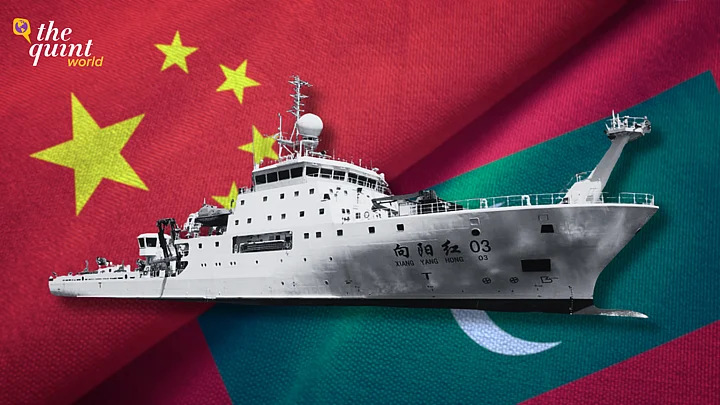In a statement on Tuesday, 23 January, the Government of Maldives has claimed that the Chinese research vessel ‘Xiang Yang Hong 3’ will not be conducting research in Maldivian waters but is scheduled for a port call.
The impending arrival of the Chinese vessel had raised concerns in India, particularly following Sri Lanka's decision to impose a one-year moratorium on Chinese research vessels, preventing them from berthing at its ports or operating within its exclusive economic zone (EEZ) starting from 1 January, in response to Indian apprehensions about Chinese vessel visits.
In a statement, the Maldives Ministry of Foreign Affairs said:
“A diplomatic request was made by the Government of China to the Government of Maldives, for the necessary clearances to make a port call, for rotation of personnel and replenishment. The vessel would not be conducting any research while in the Maldivian waters.”
Sources within the Indian Navy told The Quint that they are “closely keeping a watch on the movements and developments” of the vessel, which is reportedly heading towards the Maldivian capital of Male.
The research vessel Xiang Yang Hong 03, which departed from the Chinese port of Sanya on 16 January, is expected to arrive in Malé on 8 February, following a planned exploration of the southern Indian Ocean from January to May 2024.
Meanwhile, while Indian authorities acknowledged the development, they reportedly refrained from providing comments on the matter. Sources within the MEA told The Quint, requesting anonymity, that the activity was a “routine movement.”
Commenting on reports calling the vessel a "spy ship," the source further told The Quint:
"The ship in question is a research and survey vessel that has been in these waters before and claims to study the ocean floor and prevent natural disasters. But given that there are no checks on the information collected, only Beijing can answer whether the ship is 'spying' or not."
Despite sustained pressure from the Indian government, Maldivian President Mohamed Muizzu granted permission on 3 January for Chinese research vessels to dock in the Maldives, according to the Sri Lanka Guardian. India had previously expressed objections to the Sri Lankan and Maldivian governments regarding the docking of the Xiang Yang Hong 03.
Male says that it has “always been a welcoming destination for vessels of friendly countries and continues to host both civilian and military vessels making port calls for peaceful purposes.”
In a similar incident last October, the Chinese research vessel Shiyan 6 had docked at the port of Colombo until 28 October for replenishment and to undertake joint military scientific research with the island nation’s National Aquatic Resources Research and Development Agency (NARA) in Sri Lanka’s Exclusive Economic Zone, despite objections raised by India's External Affairs Minister S. Jaishankar with Sri Lankan President Ranil Wickremesinghe.
A Growing Chinese Presence?
In April 2023, a representative from the Indian Navy briefed the Parliamentary Standing Committee on Defence, revealing that China had experienced a significant naval expansion over just a decade, The Hindu reported.
Importantly, they noted that China's naval fleet had grown from 250 to over 350 ships, solidifying its position as the world's largest navy.
The expansion included an increased presence in the Indian Ocean Region (IOR), with five to nine Chinese ships operating in the area at any given time, alongside their research vessels.
The representative highlighted further concerns about the nature of the data generated by Chinese research activities in international waters. While regulations permit research in these waters, the representative pointed out that the data collected often has both civilian and military applications, with instances where the motives behind the presence of Chinese vessels has raised suspicion.
Importantly, following purportedly pro-China Mohd Muzzizu’s assumption of office, the vessel was referred to as one that belongs to a “friendly” country.
Moreover, the vessel’s estimated arrival later this month will come just a few days after Sun Haiyan, the Vice Minister of the International Department of the Chinese Communist Party, called on Maldives President Mohamed Muizzu, less than a fortnight after the latter’s return from China.
Muizzu’s visit saw him agree to “elevate” strategic tied with Maldives and was followed by a formal call to withdraw Indian troops from the Maldives by 15 March.
Besides holding bilateral talks with Chinese President Xi Jinping, Muizzu’s China visit was marked by signing 20 agreements, an aid of $130 million to Maldives, and a joint statement which read:
"China firmly supports the Maldives in upholding its national sovereignty, independence and national dignity, respects and supports the Maldives' exploration of a development path that suits its national conditions, and firmly opposes external interference in the internal affairs of the Maldives."
Malé and New Delhi had set up a high-level core group to negotiate the withdrawal of troops, whose first meeting took place a week ago. While another one is slated to take place in India soon, Muizzu formally asked India to withdraw its military personnel from the island.
However, the Indian readout of the meeting said that the two sides worked on "finding a mutually workable solution to enable continued operation of Indian aviation platforms that provide humanitarian and medvac services,
